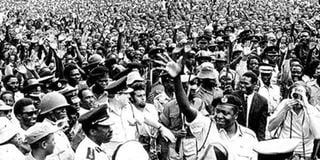TODAY IN HISTORY: Idi Amin declares himself president of Uganda

Idi Amin "Dada" waves to the crowd after capturing power. Courtesy Photo
What you need to know:
Born in 1925, Amin was raised by his mother, a traditional herbalist, and her family in a Roman Catholic household until he decided to convert to Islam and attend an Islamic school. In 1946, he joined the British colonial military regiment, the King's African Rifles, and quickly rose from an entry-level position as a cook to the highest position that could be held by a black African in the British army, a warrant officer. In 1961, he became one of the first two black commissioned officers in the regiment when he was promoted to lieutenant
On Tuesday, Feb. 2nd, 1971, one week after the coup on Obote, Major General Idi Amin declares himself president of Uganda and chief of the armed forces. Shortly after taking power he launched a genocidal program to purge Uganda of its Lango and Acholi ethnic groups and later that year, he ordered all Indians and Pakistanis to leave the country.
Born in 1925, Amin was raised by his mother, a traditional herbalist, and her family in a Roman Catholic household until he decided to convert to Islam and attend an Islamic school. In 1946, he joined the British colonial military regiment, the King's African Rifles, and quickly rose from an entry-level position as a cook to the highest position that could be held by a black African in the British army, a warrant officer. In 1961, he became one of the first two black commissioned officers in the regiment when he was promoted to lieutenant.
In 1965, Prime Minister Milton Obote and Amin were implicated in a deal to smuggle ivory and gold into Uganda from Zaire. The deal, as later alleged by General Nicholas Olenga, an associate of the former Congolese leader Patrice Lumumba, was part of an arrangement to help troops opposed to the Congolese government trade ivory and gold for arms supplies secretly smuggled to them by Amin.
In 1966, the Ugandan Parliament demanded an investigation. Obote imposed a new constitution abolishing the ceremonial presidency held by Kabaka (King) Mutesa II of Buganda, and declared himself executive president. He promoted Amin to colonel and army commander. Amin led an attack on the Kabaka's palace and forced Mutesa into exile to the United Kingdom, where he remained until his death in 1969.
In October 1970, Obote himself took control of the armed forces, reducing Amin from his months-old post of commander of all the armed forces to that of commander of the army.
Having learned that Obote was planning to arrest him for misappropriating army funds, Amin seized power in a military coup on 25 January 1971, while Obote was attending a Commonwealth summit meeting in Singapore.
Troops loyal to Amin sealed off Entebbe International Airport, the main airport, and took Kampala. Soldiers surrounded Obote's residence and blocked major roads. A broadcast on Radio Uganda accused Obote's government of corruption and preferential treatment of the Lango region. Cheering crowds were reported in the streets of Kampala after the radio broadcast. Amin announced that he was a soldier, not a politician, and that the military government would remain only as a caretaker regime until new elections, which would be announced when the situation was normalised. He promised to release all political prisoners.
Amin gave former king of Buganda and President, Sir Edward Mutesa (who had died in exile), a state funeral in April 1971, freed many political prisoners, and reiterated his promise to hold free and fair elections to return the country to democratic rule in the shortest period possible
"My mission is to lead the country out of a bad situation of corruption, depression and slavery. After I rid the country of these vices, I will then organize and supervise a general election of a genuinely democratic civilian government." -Idi Amin, quoted in "Uganda, the Human Rights Situation" by the United States Senate.

By 1978, the number of Amin's supporters and close associates had shrunk significantly. After the killings of Bishop Luwum and ministers Oryema and Oboth Ofumbi in 1977, several of Amin's ministers defected or fled into exile.
In November 1978, after Amin's vice president, General Mustafa Adrisi, was injured in a car accident, troops loyal to him mutinied. Amin sent troops against the mutineers, some of whom had fled across the Tanzanian border. Amin accused Tanzanian President Julius Nyerere of waging war against Uganda, ordered the invasion of Tanzanian territory, and formally annexed a section of the Kagera Region across the boundary.
In January 1979, Nyerere mobilised the Tanzania People's Defence Force and counterattacked, joined by several groups of Ugandan exiles who had united as the Uganda National Liberation Army (UNLA). Amin's army retreated steadily, and, despite military help from Libya's Muammar Gaddafi, he was forced to flee into exile by helicopter on 11 April 1979, when Kampala was captured.
On 19 July 2003, one of Amin's wives, Madina, reported that he was in a coma and near death at the King Faisal Specialist Hospital and Research Centre in Jeddah, Saudi Arabia, from kidney failure.
She pleaded with the Ugandan President, Yoweri Museveni, to allow him to return to Uganda for the remainder of his life. Museveni replied that Amin would have to "answer for his sins the moment he was brought back".
Amin's family reportedly decided to disconnect life support and Amin died at the hospital in Jeddah on 16 August 2003.
Additional information obtained from Wikipedia




